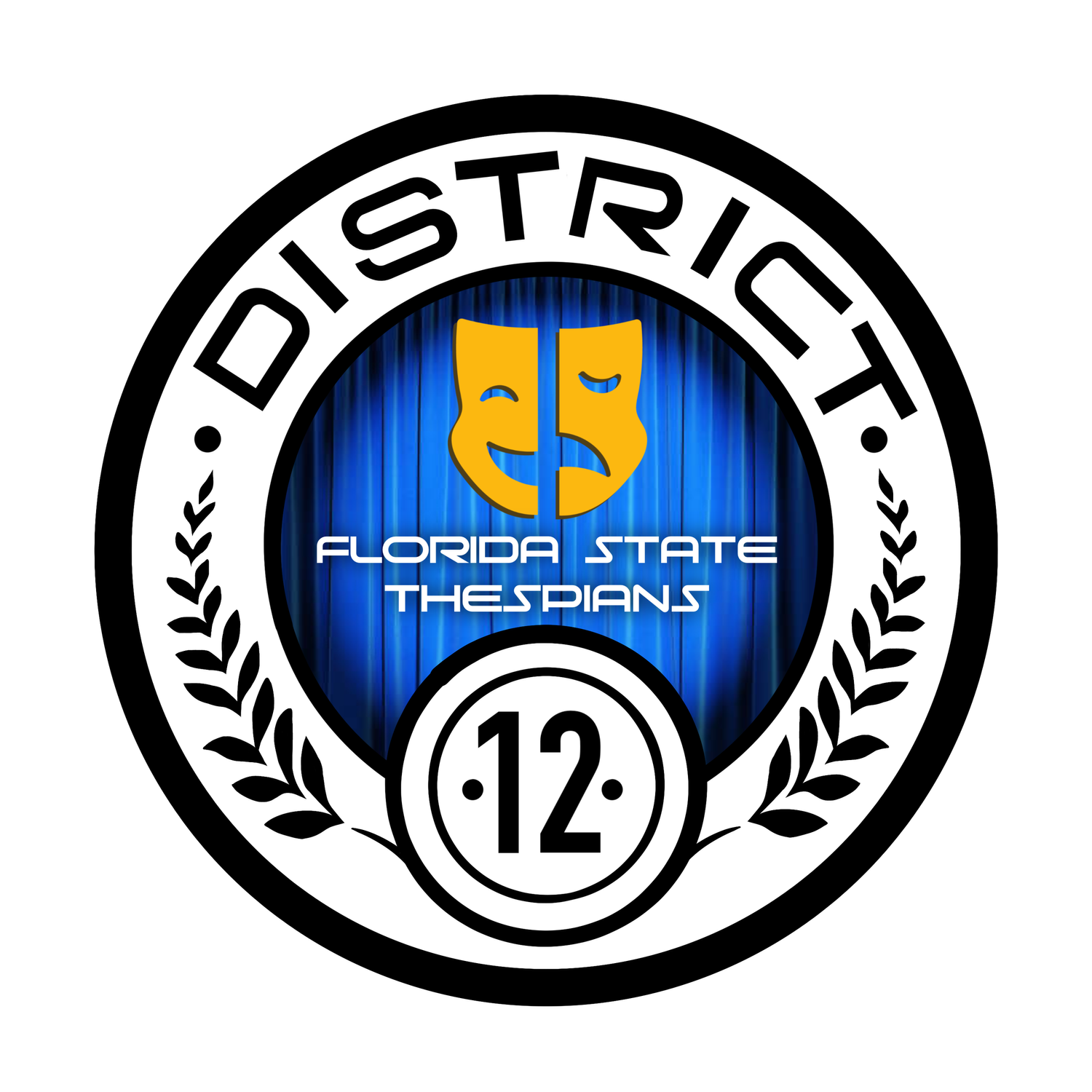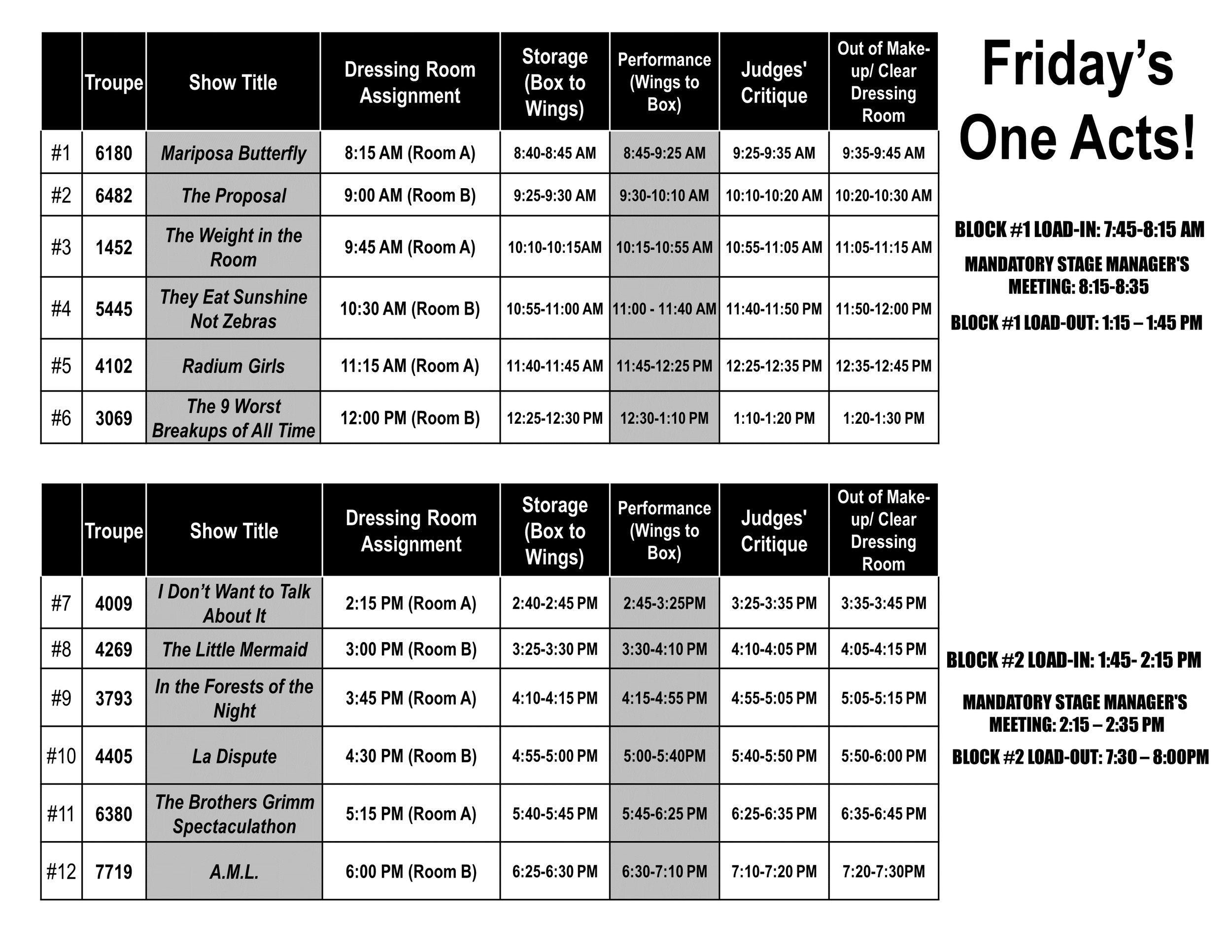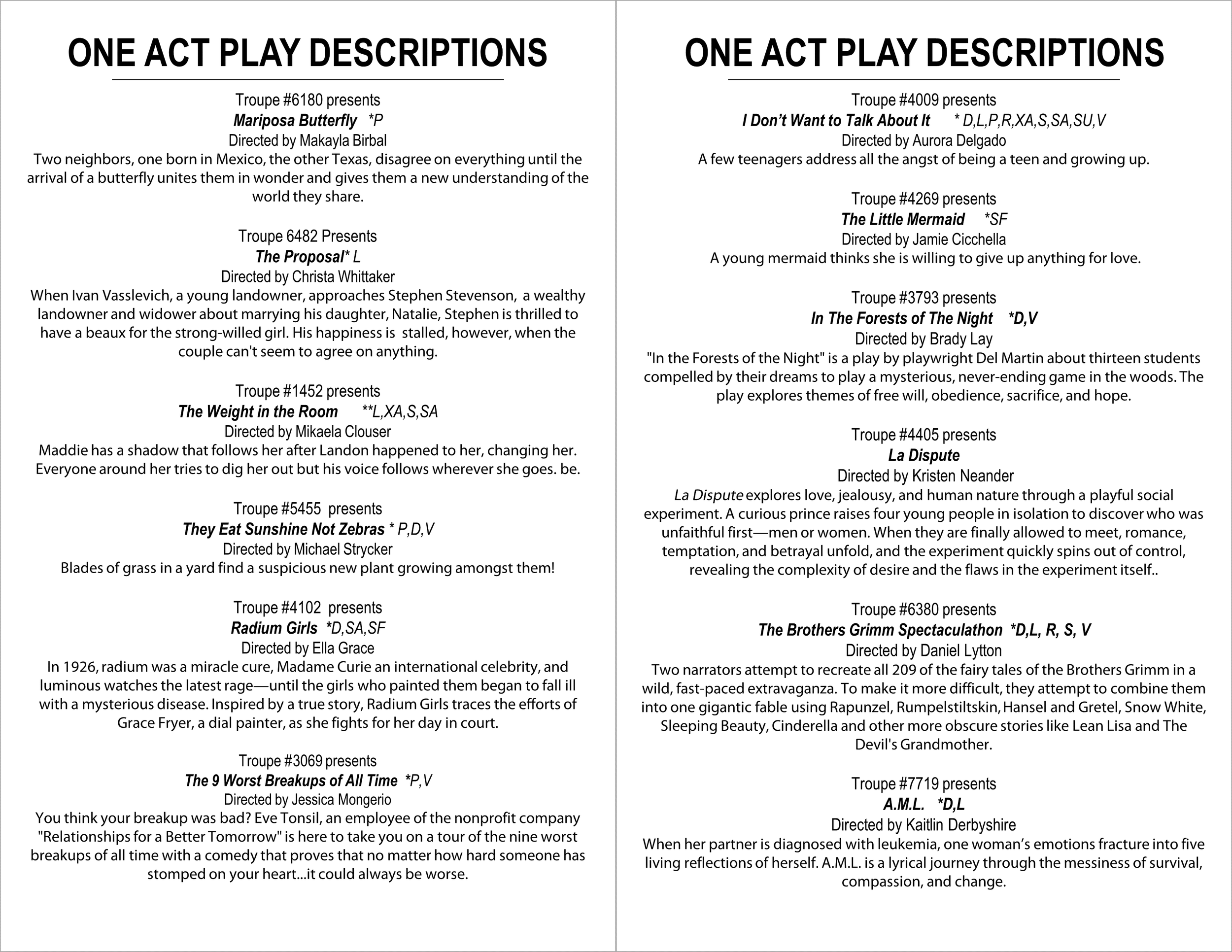2025 One Acts
Any violation of the General Rules of Florida State Thespians’ One Acts will be subject to disqualification and/or disciplinary action by the Board of Directors
Each district should attempt to ensure that the one acts presented at its individual festival adhere to the following rules as closely as possible.
Selection of One Act Plays
Entrees may come from published plays, original works, or cuttings from full length plays. Both musicals and non musicals are acceptable. Readers’ theatre or chamber theatre pieces are not allowed.
Each Troupe is permitted to submit only one entry.
There is a one-year performance moratorium on plays presented at the District and State Festivals.
Proof of the payment of royalties must accompany registration. Written permission for cuttings and/or original work must be included if applicable.
The playwright and publisher must be included on the registration form.
For a one act play to perform at the State Festival it must be performed at and receive a Superior rating at the district level.
The number of Superior rated plays permitted to showcase at the State Festival will be determined by the following formula:
1-6 plays performed at District—1
7- 12 plays performed at District—2
13-18 plays performed at District—3
19-24 plays performed at Districts—4
25 or more plays performed at Districts—5
If a district breaks the one act ratio rule and sends more than their allotted number of one act plays to the State Festival, that district will be barred from bringing any one act plays the following year.
All schools must be currently affiliated with the International Thespian Society to be considered for performance at the State Festival. Affiliation must be current on or before the date specified by the State Director.
If a district chooses an alternative one act to perform at the State Festival, the Chairperson of that district must inform the State Director of that change prior to the January board meeting. After the January board meeting, if a one act is unable to perform, it will not be replaced by an alternate.
Preliminary and General Considerations
All students involved with the one act must be currently enrolled students attending classes at the same school as the troupe presenting the one act. Home schooled students may be included in a troupe’s production if those students reside within the boundaries of that school. An exception will be made for any sponsor who runs the lights or sound for the production.
The cast of the play being performed at the State Festival must be the same as the one performed at the District Festival. The State Director must be informed of any changes due to extreme circumstances. Permission to make such a change is at the discretion of the State Director.
The performance appearing at the State Festival should be presented as closely as possible as it was performed at the District Festival which should be performed as closely as possible to the one approved by the school’s principal. If the production does not meet community standards at the troupe’s school, it will not meet them anywhere else.
Sponsors must notify the District Chairperson at the district level and the State Director at the state level if the play contains language and/or stage business that members of the audience may find offensive. A brief description of the nature of the offensive material should also be included. An alert to possibly offensive material will be noted in the program.
One act plays must be directed by the troupe’s sponsor as listed on official troupe documents or a currently enrolled student under the sponsor’s supervision.
Six programs for each presented play should be provided by the troupe. These programs will be collected at the Stage Manager/Directors’ meeting. Additional programs may be made available to the audience at the troupe’s discretion.
No advertising may appear in programs distributed during the festival.
Prior to a performance, no chewing gum, drinks, food, or smoking is permitted on stage, backstage, or in the loading dock.
All remnants of any food or drink consumed in the dressing rooms must be removed before the room is vacated. Dressing rooms must be left at least as clean as they were when each troupe occupied them.
Load-in/Load-out and Pre-show
A working cell phone number must be supplied by each participating troupe’s sponsor. The sponsor must remain available for communication during the entire section of time between load-in and load-out including performance.
All troupes must adhere to the published load-in/load-out schedule.
Once a truck has unloaded or is loaded it must be moved out of the dock as quickly as possible to make room for another truck.
Each troupe will be allotted a storage area backstage. This area will be a clearly defined 6’ x 9’ rectangle.
No item in the 6’ x 9’ storage area may be placed on top of another item to create a stack in excess of 6’ total height.
Each Troupe will be given a thirty-minute makeup and costume period in a dressing room.
No costumes or stage makeup may be worn before entering the dressing room at each performing troupe’s assigned time on the day of the troupe’s performance.
A troupe requiring more time to execute elaborate makeup, hair-dos, or other business must indicate this request on its registration packet. This request should include an estimate of how much additional time will be needed and a description of why it will be needed. Permission will be granted based on this information.
The director and stage manager of each one act are required to attend a meeting at a scheduled time after load-in and prior to the beginning of that section of one acts. Each participating troupe will be informed in advance as to the location and time of this meeting. This is a very important meeting; attendance is mandatory.
Persons directing trucks into the main Straz Center loading dock which services the Ferguson and Morsani Theatres should never be on the same level as the trucks. Trucks should be directed from the upper level of the dock.
Persons directing trucks into any loading area must exercise extreme caution at all times.
All those involved in loading in/out should dress as stage hands. No overly baggy clothing, skirts, or long hair hanging loose.
Everyone working on the loading dock must wear appropriate shoes. This includes students, directors, sponsors, technicians, helpers, parents, chaperones, and board members. Appropriate footwear includes closed toe, closed heel, low heel shoes such as tennis shoes or work boots. Examples of unacceptable shoes include sandals, flip-flops, slippers, clogs, high heels, sling backs, etc.
All sets must be ready for production prior to loading in. Only basic, normal reassembly of set pieces will be permitted. Unusually complicated construction, sawing, painting, etc. in the opinion of the One Act Manager and/or the Event Manager will not be permitted in any area of the venue.
No venue will supply tools to any troupe for set construction or assembly.
Running is forbidden anywhere in any venue.
Climbing onto or jumping off the elevated loading dock is forbidden.
Once a troupe has loaded in its set and props, all those involved except those attending the Stage Manager/Directors’ meeting must leave the area.
The stage wings, loading area, or dressing room hallways may not be used as a rehearsal space.
Do not loiter or assemble on the loading dock, in the hallways or back stage at any time.
All troupe items, including but not limited to props, set pieces, costumes, makeup, backpacks, etc. must be removed at the scheduled load-out. Any item left after the scheduled load-out will be discarded.
All personal items must be removed from the dressing rooms. All items left in the dressing rooms will be discarded before the next troupe’s time in the room begins.
At the State Festival, costumes may be placed on portable racks supplied by the venue at the time of your load-in but must be removed during load-out.
Always be alert for moving vehicles during both load-in and load-out.
Any use of weapons including the use of guns must be indicated in festival registration, or the weapon cannot be used in the one act.
Any prop gun used in a one act play must be locked and secured in the custody of the one act chair upon the troupe’s arrival at the performance venue and for the duration of the day of performance.
All non-gun weapons must be checked in with the one act chair or event coordinator on the day of the performance and kept in that troupe’s 6×9’ box from load in to load out.
Performance
No video or audio recording is permitted during any one act performance.
Prior to performances all performers and technicians must remain in assigned dressing rooms until given permission to leave.
Each troupe will be allotted FORTY (40) minutes to move their set from the designated offstage WING area to the stage, perform their one act and return everything to the offstage BOX. The adult in charge of one acts has the discretion to move your one act to the wings at a more appropriate time to ensure a safe orderly turnover. The troupe is well served in choosing a one act that has 30 minutes or less of actual performance time.
Troupes that exceed the time limit at District Festival will not be selected for the State Festival.
Technicians working sound or lights in an area not backstage may move to their locations five minutes prior to the beginning of his/her troupe’s performance time.
Time begins immediately after the One Act Manager/Coordinator informs the troupe stage manager to begin and the stage manager says “Go.”
Time ends when the stage manager informs the designated One Act Manager that everything is “Clear”, the stage is inspected, and the One Act Manager agrees with the troupe’s stage manager. To facilitate this, the One Act Manager should closely monitor the entire action. Time does not end until the One Act Manager has certified everything is truly clear, the stage is cleaned of all debris, and everything is safely stored in the troupe’s assigned storage area.
The official time will be kept by the designated One Act Manager who may at his/her discretion appoint other timekeepers to help verify his/her times. The designated One Act Manager is responsible for recording the official time.
No cues or actions are permitted before or after these two calls of “Go” and “Clear” by the stage manager except as required by the One Act Manager/Coordinator.
All music and/or sound effects must be contained within the forty-minute time limit.
No sponsor is allowed backstage during his/her troupe’s allotted time. Backstage is defined as any area involved with the production of the one act that is not seen by the audience. If necessary, an exception will be made for sponsors who run the light or sound systems during a performance from a position not frequented by the majority of other students involved with the actual production. Sponsors requesting this exception must submit this desire in writing with their registration.
Sponsors or any other adult may not assist students in any way during the allotted time except as specified above.
Only registered members of the performing school’s cast and crew, venue technicians, adjudicators, and those granted permission by the One Act Manager/Coordinator are permitted backstage during any performance.
Headsets and technician communication during a performance will be provided by each venue. The use of any other method of electronic communication is not allowed.
The use of a follow spot is not permitted.
If it is necessary to use a fly system, the sponsor must include a letter with the registration packet stating the specific reason for using this system and how it is intended to be used. Written permission to use the fly system by the manager of the venue and the One Act Manager/Coordinator must be granted in advance of the performance. Be aware that not all venues are equipped with fly systems.
The use of any aerosol products (including but not limited to paint, hairspray, hair color, cleaning products, etc.) must be completely contained. None of the product can escape to the floor or curtains in any venue.
No food or drink may be used on stage without the prior written approval of the One Act Coordinator. Include the need to consume food or beverages on stage with your registration.
The use of smoke, fire, candles, matches, butane lighters, haze, fog, pyrotechnical effects or any other form of an open flame is strictly forbidden.
Prop weapons and Guns: A prop gun may be used if essential to the scene as long as it meets the following criteria:
The gun prop may have no moving parts.
The gun prop must have a solid filled barrel.
Students may not carry or transport the prop gun to or from the performance site. The weapon must be surrendered at the stage manager’s meeting and held in a secure place until the troupe begins their box to wing time. It must be returned to the one act coordinator after the performance.A written critique of each participating troupe’s one act performance will be given to the sponsor following an oral critique by members of the adjudicating team at the State Festival.
The spraying, throwing, sprinkling, spilling, dropping, or scattering of any liquid, powder, cleaning product, or any substance that cannot be removed completely by a broom as a part of the strike is strictly forbidden. Special care should be taken if any form of glitter, powder, or confetti is used as a part of a production, costume or makeup. All remnants must be removed from the floor before each troupe’s allotted time expires.
Since brooms may not be available at all venues, each participating troupe should supply its own. The lack of a broom will not be an excuse for not cleaning the stage within the allotted time.
Do not jump off or on to the stage from the apron before, after, or during a performance.
Please be aware of the area microphones on the floor of the apron. They are not “Thespian Speed Bumps.” Plan your blocking so that all members of your troupe’s cast and crew remains in the designated acting area.
Do not plug anything into any electrical outlet. Submit any special electrical requirements with your registration packet.
Refrain from handling or touching any curtains or masking material. Even touching a curtain with the cleanest hand can reduce the life of material.
Do not use masking, duct, Scotch, or any other tape on the stage floor. If you need to spike the stage, secure approval from the One Act Manager/Coordinator.
Do not touch or use anything that does not belong to you or your troupe. This includes, but is not limited to, ladders, stage weights, chairs, etc.
The initial set up and strike for every one act play must be done in full view of the audience.
At the discretion of the District Chair, violation of any One Act rule at the District Festival will prevent a Troupe’s selection for One Act performance at the State Festival.
During a performance at the State Festival, at the discretion of the One Act Manager/Coordinator, blatant violation of any of these rules will disqualify the violating Troupe’s participation at the following year’s One Act event at State Festival.



